A new IVF treatment for 42-year olds drastically increases the chances of a successful pregnancy with the possibility of having a baby same as that of a 32-year old.

It works by picking only the embryos most likely to create a healthy foetus, slashing the odds of miscarriage.
Crucially, it also involves the embryos being frozen for at least a month after IVF to allow the woman's reproductive organs to return to normal.
Scientists believe that the powerful fertility-boosting drugs given during IVF can harm the embryo if it is put into the womb too soon.
A woman aged 40 to 42 typically has a low chance of becoming pregnant with IVF and is unlikely to conceive naturally. But the researchers from Colorado said that their procedure could boost success rates to 60 per cent.
Patients will pay 2,000 pounds for the test, on top of a cycle of IVF costing 3,000 pounds to 4,000 pounds a course. The process has already been used on 1,200 women in the US.
Advertisement
An ideal blastocyst has 46 chromosomes - 23 each from the sperm and the egg. The wrong chromosome count reduces the odds of pregnancy - or 'implantation' - and raises the risk of miscarriage. Only if the cells have 46 chromosomes is the embryo frozen.
Advertisement
" What we've been able to show is that a woman aged 38 to 42, if she has a blastocyst with a normal number of chromosomes, her chances of implantation are independent of her age. So she has the same chances of implantation - at 60 per cent - as a woman who is 32," the paper quoted Dr Mandy Katz-Jaffe, from the Colorado Center for Reproductive Medicine, as saying.
Oxford academic Dr Dagan Wells, who helped develop the process, said freezing the embryo, known as cryopreservation, not only boosted the chances of pregnancy but also produced healthier babies.
He added: "The birth weight of the babies is essentially the same as babies conceived naturally, whereas embryos produced by IVF and transferred immediately, without cryopreservation, have a tendency to be of lower weight."
The scientists will explain their new IVF treatment at the American Society for Reproductive Medicine conference in San Diego, California.
Source-ANI















